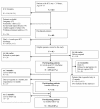Posttraumatic stress, anxiety and depression symptoms in patients during the first year post intensive care unit discharge
- PMID: 20144193
- PMCID: PMC2875529
- DOI: 10.1186/cc8870
Posttraumatic stress, anxiety and depression symptoms in patients during the first year post intensive care unit discharge
Abstract
Introduction: To study the level and predictors of posttraumatic stress, anxiety and depression symptoms in medical, surgical and trauma patients during the first year post intensive care unit (ICU) discharge.
Methods: Of 255 patients included, 194 participated at 12 months. Patients completed the Impact of Event Scale (IES), Hospital Anxiety and Depression Scale (HADS), Life Orientation Test (LOT) at 4 to 6 weeks, 3 and 12 months and ICU memory tool at the first assessment (baseline). Case level for posttraumatic stress symptoms with high probability of a posttraumatic stress disorder (PTSD) was > or = 35. Case level of HADS-Anxiety or Depression was > or = 11. Memory of pain during ICU stay was measured at baseline on a five-point Likert-scale (0-low to 4-high). Patient demographics and clinical variables were controlled for in logistic regression analyses.
Results: Mean IES score one year after ICU treatment was 22.5 (95%CI 20.0 to 25.1) and 27% (48/180) were above case level, IES > or = 35. No significant differences in the IES mean scores across the three time points were found (P = 0.388). In a subgroup, 27/170 (16%), patients IES score increased from 11 to 32, P < 0.001. No differences in posttraumatic stress, anxiety or depression between medical, surgical and trauma patients were found. High educational level (OR 0.4, 95%CI 0.2 to 1.0), personality trait (optimism) OR 0.9, 95%CI 0.8 to 1.0), factual recall (OR 6.6, 95%CI 1.4 to 31.0) and memory of pain (OR 1.5, 95%CI 1.1 to 2.0) were independent predictors of posttraumatic stress symptoms at one year. Optimism was a strong predictor for less anxiety (OR 0.8, 0.8 to 0.9) and depression symptoms (OR 0.8, 0.8 to 0.9) after one year.
Conclusions: The mean level of posttraumatic stress symptoms in patients one year following ICU treatment was high and one of four were above case level Predictors of posttraumatic stress symptoms were mainly demographics and experiences during hospital stay whereas clinical injury related variables were insignificant. Pessimism was a predictor of posttraumatic stress, anxiety and depression symptoms. A subgroup of patients developed clinically significant distress symptoms during the follow-up period.
Figures


Comment in
-
The burden of adverse mental health outcomes in critical illness survivors.Crit Care. 2010;14(1):125. doi: 10.1186/cc8867. Epub 2010 Feb 25. Crit Care. 2010. PMID: 20236473 Free PMC article.

